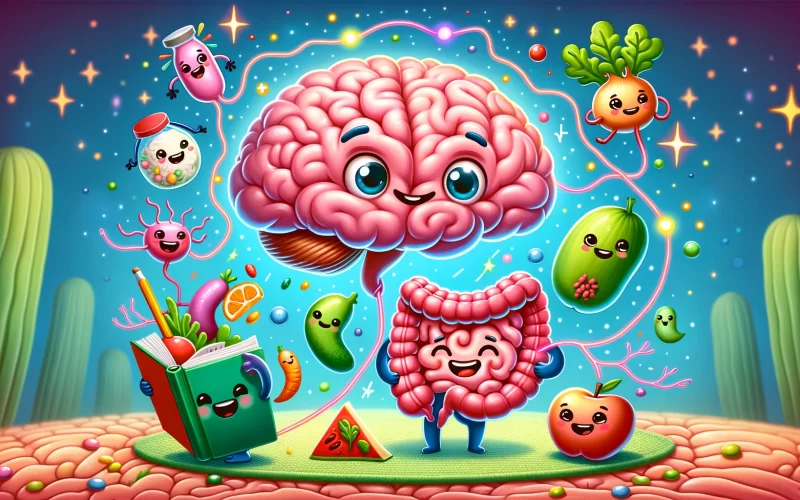Have you ever had a “gut feeling” about something or felt butterflies in your stomach when you were nervous? It turns out there’s more truth to these expressions than you might think. Welcome to the world of the gut-brain connection, where your stomach and brain are in constant communication, influencing everything from your mood to your overall health. Let’s dive into this fascinating link with some funny comparisons and relatable scenarios.
The Gut as the “Second Brain”
Your gut is often referred to as the “second brain” because it has its own nervous system, called the enteric nervous system (ENS). The ENS contains over 100 million nerve cells lining your gastrointestinal tract from esophagus to rectum. This complex system can operate independently of the brain and has a direct line of communication with it via the vagus nerve.
Funny Comparisons: The Gut and the Brain
- The Overachiever:
- Just like that friend who’s always juggling a million tasks, your gut is multitasking all the time. It’s not only digesting food but also producing neurotransmitters like serotonin and dopamine, which affect your mood and mental health. Approximately 90% of your body’s serotonin is produced in the gut!
- The Drama Queen:
- When you’re stressed, your brain sends out distress signals, and your gut responds dramatically. Ever had to rush to the bathroom before a big presentation? That’s your gut reacting to stress hormones like cortisol. It’s like your gut is throwing a tantrum because it feels your anxiety.
- The Gossip:
- Your gut loves to talk to your brain, constantly sending messages through the vagus nerve. It’s like that friend who always keeps you in the loop, whether you want to hear the latest news or not. These messages can influence your mood, emotions, and even decision-making.
Relatable Scenarios: The Gut in Action
- The Job Interview Jitters:
- You’re about to walk into a job interview, and suddenly, your stomach is in knots. This is your gut reacting to stress, preparing you for the challenge ahead. It’s the same reason you might lose your appetite before a big event.
- The Comfort Food Cravings:
- After a tough day, you find yourself craving mac and cheese or ice cream. Your gut is seeking foods that boost serotonin levels to help you feel better. It’s like your gut is giving you a hug, telling you everything will be okay.
- The Food Coma:
- You’ve just finished a huge holiday meal, and now you can barely keep your eyes open. Your gut is working overtime to digest all that food, diverting blood and energy away from your brain, making you feel sleepy. It’s your gut’s way of saying, “Let’s take a nap and process all this.”
The Science Behind the Gut-Brain Connection
- Microbiome Magic:
- Your gut is home to trillions of bacteria, collectively known as the microbiome. These tiny organisms play a crucial role in your overall health, influencing everything from digestion to immune function. They also produce neurotransmitters that affect your brain.
- The Vagus Nerve Superhighway:
- The vagus nerve is like a superhighway connecting your gut and brain, allowing them to communicate rapidly. This nerve plays a key role in regulating digestion, mood, and stress levels.
- Inflammation and Mental Health:
- Chronic inflammation in the gut can lead to increased inflammation in the brain, which has been linked to mental health conditions like depression and anxiety. Keeping your gut healthy can help keep your mind healthy too.
Tips for a Happy Gut and a Happy Mind
- Eat a Balanced Diet:
- Include plenty of fiber, fruits, vegetables, and fermented foods to nourish your gut microbiome. A healthy gut supports a healthy brain.
- Stay Hydrated:
- Drinking enough water helps maintain the mucosal lining of the intestines and supports the balance of good bacteria in the gut.
- Manage Stress:
- Practice stress-reducing activities like yoga, meditation, or even a good laugh with friends. Reducing stress can improve both gut and brain health.
- Get Enough Sleep:
- A good night’s sleep is essential for overall health. Poor sleep can disrupt the gut microbiome and negatively impact your mood.
- Exercise Regularly:
- Physical activity promotes healthy gut function and can boost your mood by increasing the production of endorphins.
Conclusion: Embrace Your Gut Instincts
The gut-brain connection is a powerful and fascinating aspect of our biology. By understanding and nurturing this relationship, you can improve both your digestive health and mental well-being. So next time you have a gut feeling or butterflies in your stomach, remember: your gut might just be onto something. Embrace the wisdom of your “second brain” and enjoy the benefits of a happier, healthier you.

